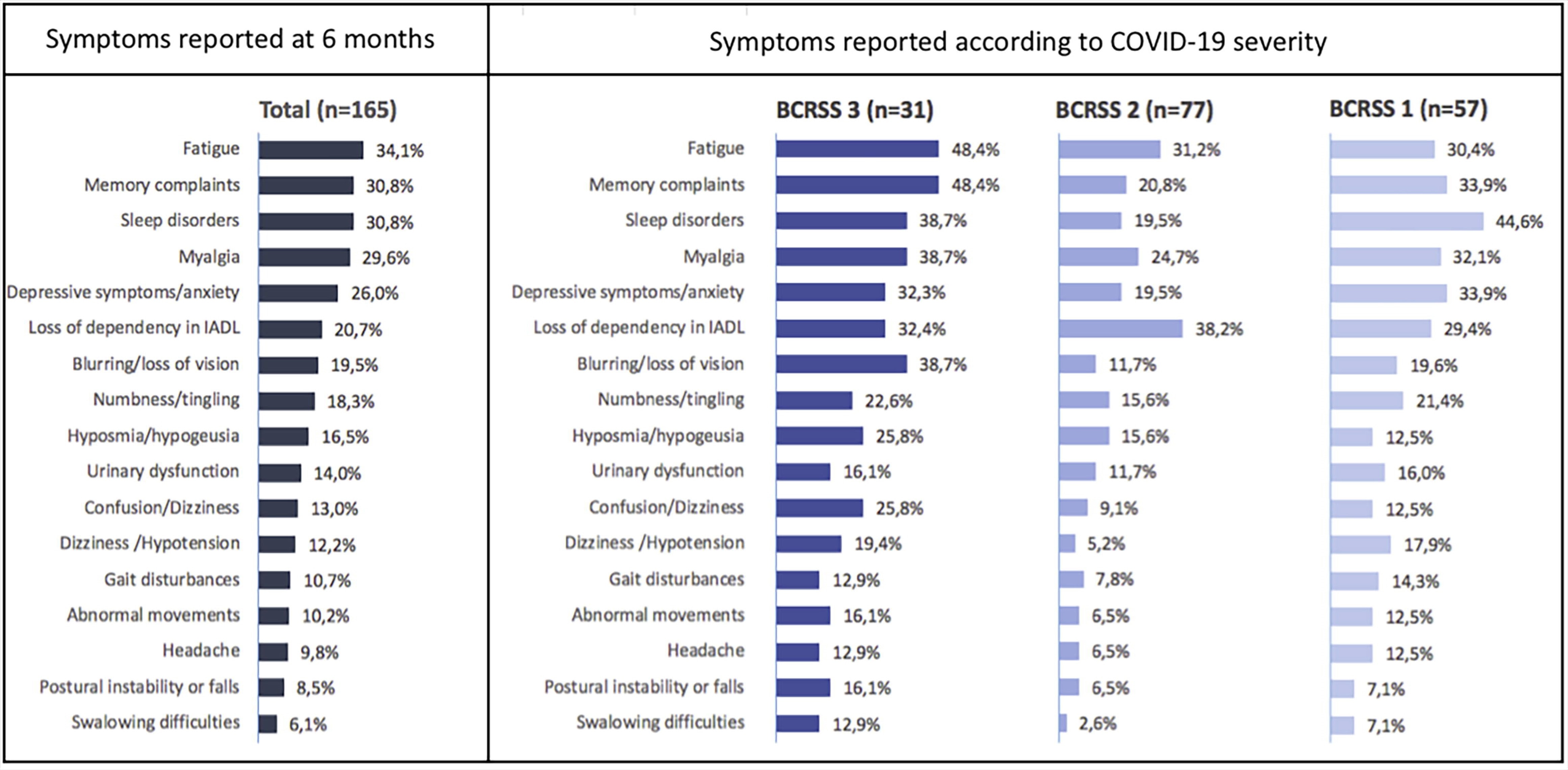Many reports of persistent symptoms indicative of long term sequelae, including neurological symptoms, are reported in patients who have recovered from COVID-19 (coronavirus disease 2019) illness. Sequela, a condition consequent of a previous injury or disease, presents new complications to therapy providers.

 This news article was a review of a preliminary scientific report that had not undergone peer-review at the time of publication. Since its initial publication, the scientific report has now been peer reviewed and accepted for publication in a Scientific Journal. Links to the preliminary and peer-reviewed reports are available in the Sources section at the bottom of this article. View Sources
This news article was a review of a preliminary scientific report that had not undergone peer-review at the time of publication. Since its initial publication, the scientific report has now been peer reviewed and accepted for publication in a Scientific Journal. Links to the preliminary and peer-reviewed reports are available in the Sources section at the bottom of this article. View Sources
In this ongoing pandemic, doctors and researchers have found several post-COVID manifestations. Many COVID-19 patients experience neurological symptoms and syndromes. The long term impact of severe acute respiratory syndrome coronavirus 2 (SARS-CoV-2), the causative agent of COVID-19) infection on the brain is uncertain.
In a longitudinal study recently published on the preprint server medRxiv*, Andrea Pilotto et al. find that one-third of COVID-19 infection survivors have long-term neurological manifestations after hospitalization. The survivors displayed a wide array of neurological symptoms: fatigue, from memory and attention issues to sleep disorders, myalgias followed by depression/anxiety, visual disturbances, tremors, and anosmia, the loss of the sense of smell.

Prevalence of neurological symptoms in the whole samples and in subgroups of patients stratified by COVID-19 severity. Abbreviations: BCRSS, Brescia-COVID Respiratory Severity Scale; IADL, instrumental activities of daily living
The study cohort included a sample of 165 COVID-19 survived patients who were reassessed according to a structured, standardized clinical protocol. These patients were examined six months after discharging a COVID-19 Unit of the ASST Spedali Civili Hospital, in Italy, between February and April 2020.
The team performed a 6-month follow-up after hospitalization and found that the patients suffered fatigue (34%), memory/attention (31%), and sleep disorders (30%) being the most frequent. Upon neurological examination, they found that patients exhibited neurological abnormalities, being-cognitive deficits, hyposmia (decreased sense of smell), and postural tremor, the most common.
It was observed that the patients who reported neurological symptoms were the ones affected by more severe respiratory SARS-CoV-2 infection parameters during hospitalization.
Patients with high disease severity reported memory complaints and visual disturbances. The team found that the neurological abnormalities were associated with older age, higher pre-morbid comorbidity index, worse BCRSS (Brescia-COVID Respiratory Severity Scale), longer hospitalization duration, and a higher number of neurological symptoms reported.
The best predictors of neurological abnormalities were identified in this study as 1). the duration of hospitalization and 2). the pre-morbid comorbidity index (i.e., illness present before the onset of COVID-19). The cognitive impairment was specifically associated with the severity of COVID-19 independently from age and pre-morbid conditions. It is conclusive that hospitalization and severity of COVID-19 have a large impact on patients with other illnesses.
“In this study, patients with neurological diseases developed during the acute phase of SARS-CoV-2 infection were not considered, thus potentially underestimating the global neurological burden due to COVID-19.”
This study supports previous evidence of long term consequences of COVID-19 involving both central and peripheral nervous systems. The SARS-CoV-2 infection manifested in COVID-19 is primarily a respiratory illness. However, closer examination reveals multiple organs and their functioning being impaired due to the SARS-CoV-2 infection.
Multiple neurological abnormalities, including mild cognitive impairment, have been associated with the severity of respiratory SARS-CoV-2 infection. This study evaluates any neurological manifestations after six months of follow-up in COVID-19 survivors and their potential relationship with pre-morbid conditions and severity of SARS-CoV-2 infection. The team also argues that long-term neurological problems may seem common even in patients with less severe disease. This study emphasizes the importance of evaluating the impact of SARS-CoV-2 infection on brain health status.
The “post-COVID-19 syndrome” has debilitated many lives, often forcing the survivors to return to the doctor. It is important to study and investigate the prevalence, type, duration, and severity of persistent symptoms, following the resolution of acute SARS-CoV-2 infection. This research helps to pinpoint the underlying cause ̶ subsequently provide better rehabilitation and care for the patients.

 This news article was a review of a preliminary scientific report that had not undergone peer-review at the time of publication. Since its initial publication, the scientific report has now been peer reviewed and accepted for publication in a Scientific Journal. Links to the preliminary and peer-reviewed reports are available in the Sources section at the bottom of this article. View Sources
This news article was a review of a preliminary scientific report that had not undergone peer-review at the time of publication. Since its initial publication, the scientific report has now been peer reviewed and accepted for publication in a Scientific Journal. Links to the preliminary and peer-reviewed reports are available in the Sources section at the bottom of this article. View Sources
Journal references:
- Preliminary scientific report.
COVID-19 severity impacts on long-term neurological manifestation after hospitalisation, Andrea Pilotto, Viviana Cristillo, Stefano Cotti Piccinelli, Nicola Zoppi, Giulio Bonzi, Davide Sattin, Silvia Schiavolin, Alberto Raggi, Antonio Canale, Stefano Gipponi, Ilenia Libri, Martina Frigerio, Michela Bezzi, Matilde Leonardi, Alessandro Padovani, medRxiv 2020.12.27.20248903; doi: https://doi.org/10.1101/2020.12.27.20248903, https://www.medrxiv.org/content/10.1101/2020.12.27.20248903v1
- Peer reviewed and published scientific report.
Pilotto, Andrea, Viviana Cristillo, Stefano Cotti Piccinelli, Nicola Zoppi, Giulio Bonzi, Davide Sattin, Silvia Schiavolin, et al. 2021. “Long-Term Neurological Manifestations of COVID-19: Prevalence and Predictive Factors.” Neurological Sciences 42 (12): 4903–7. https://doi.org/10.1007/s10072-021-05586-4. https://link.springer.com/article/10.1007/s10072-021-05586-4.